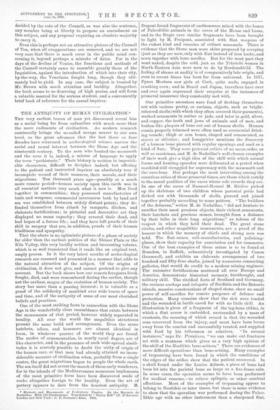VENICE.* Mn. HORATIO Bnowsr is one of those specially favoured
persons,—a man with a subject. There is no more precious gift in the present day ; the knowing something or other which nobody else knows—it does not matter much what it is —where the Pamirs are, or how they make jute, or what Mr.
* Venice an Historical Sketch of the Republic. By Horatio P. Brown, London Percival and Clc. Gladstone takes for breakfast, or some such interesting and profitable branch of learning, is the one apparent passport to success in literature, especially periodical literature. It is not even absolutely necessary to know much about it if other people know less. But Mr. Brown does know his subject; the accident of residence, combining with long and careful study of the Venetian archives, have given him a familiarity both with the history and the life of Venice, past and present, to which, perhaps, no other Englishman, since the death of our author's namesake, Mr. Rawdon Brown, could pretend. Mr. Ruskin, of course, has made Venice his own in his particular way, and no one would attempt to encroach upon his king- dom; but then Mr. Ruskin is a man apart, not to be compared with others. Besides, he has a playful habit of adapting Venetian history to suit his views of what should have happened, which would be reprehensible if it was done by anybody else.
We would not grudge Mr. Brown a monopoly of his subject, for it must be admitted that he has not shown himself unduly puffed-up by the sense of this inestimable possession, but has handled it with singular discretion, not to say abstinence. We knew a man once who made a journey to a remote portion of a distant continent. He was not the first Englishman who had been there, nor the second; but he may have been among the first three or four dozen, and the way he worked that one expedition was a marvel to behold. In a .single year's time he bad scattered it over fifteen magazine articles—besides in- numerable contributions to the newspapers—and a book in two large quarto volumes. When he finished with his writing, they gave him a Government post in the department —whatever it may be—which looks after the affairs of that remote district ; it was obviously the necessary thing to do. Mr. Brown has probably no such reward to look forward to ; but at any rate he has used his opportunities with greater moderation. In some ten years we can recollect a volume of light, pleasant essays on the life of the lagoons, a somewhat drearier volume chiefly composed of historical sketches, and a valuable work on the Venetian Press. Beyond this we have only the present volume, which by rights should be the last,— for after this exhaustive, though condensed, history of the city's fortunes, what more remains to be said ? We are not without a feeling of anxiety as to what will become of Mr. Brown and his subject in the not distant future. Will he spend his future leisure in expanding the present work into five or six volumes, which no one will read, after the manner of historians P or will he be obliged to go forth, a homeless wanderer, into the wilds of terra firma, and search for new material among the commonplace cities of the mainland?
The book before us certainly contains such a concentrated essence of the history of Venice, that its subsequent expansion would hardly be a difficulty. Indeed, it is a fresh proof of the author's modesty that, having all the stores of knowledge required for the composition of this book in his hand, he was content to inflict so small a dose of it upon the public. We are not sure that his style may not suffer by it ; for there are but few writers—Sir Erskine May was probably the most remarkable example—who can pat extremely condensed facts into a palatable form. Mr. Brown does seem occasionally to feel himself rather restrained by the fetters of brevity, as, for instance, in his account of the Carmagnola tragedy, which loses some of its wonted interest in the dry version presented to us here. Again, the story of the Foseari appears unnecessarily prolix in some parts, while in others unduly condensed. On the other hand, the exciting history of the siege of Chioggia is told in a more lively and vivid manner, not unworthy of that critical period, when Carlo Zen's galleys came in sight just soon enough to release the Venetian admiral from his pledge to raise the siege, if no reinforcements arrived by that very day. To dwell upon the more picturesque incidents is not, however, Mr. Brown's object. The plan of his work is less to lay before us the details of history, than to show its meaning, to examine the causes and follow out the effects of each event, and show their bearing on each other and on the general theme. The great merit of the new school of history lies in this earnest search for the true meaning of history, a process as diverting as it is laudable, for each new inquirer can find out a new meaning for himself. Mr. Brown has set himself to explain in turn why Venice was built at all, how it came to its present situation, why it was never conquered in its early days, how it held the balance between Eastern and Western Powers, why it took up its peculiarly Erastian attitude towards the Church, how it acquired its peculiar oligarchical constitution, and what causes led to its prosperity and to its decline. The reader feels himself somewhat in the position of the audience at a popular lecture with demonstrations. Hardly has he had time to get round the corner of an event, when he comes again upon Mr. Brown, with his chalk and his black-board, ready to prove by figures that such an incident must necessarily have followed upon the conditions expounded three pages back, and inevitably leads to the consequences detailed in the next chapter. This is the broad path to know- ledge, and we speak of it in the author's condign praise.
In no instance has Mr. Brown done his work as a historian better than in the account of that strange and critical period when the liberties of the Venetian people were deliberately taken away from them by the quiet, determined action of one dominant faction. It is usually spoken of as an aristo- cratic revolution, chiefly, perhaps, en account of its result in setting up an irremovable oligarchy, partly also because the leaders of the party did belong to families called noble. But the greatest and most ancient houses are rarely to be found among those who wished to establish themselves as the per- petual lords of Venice. More frequently we see their repre- sentatives heading popular revolutions against the new policy. The ancestors of Bajamonte Tiepolo—the Gran Cavaliere, as the people admiringly called him---sind Marco Querini had been Tribunes of the Sea in the earliest dawn of Venetian history, before the election of the first Doge in 697. The new oligarchy consisted, as Mr. Brown points out, to a great extent of the newer families, who had risen through the capture of Constantinople and the extraordinary influx of wealth into Venice following upon that act of piracy. Indeed, the law which brought about the famous Serrata of the Great Council, stipulates that its members are to be balloted for by the Council of Forty out of those who during the last four years have had a seat in it. A more arbitrary distinction could hardly be drawn. It is true that three electors were appointed to suggest new names to the Forty for admission into the Great Council, but they soon passed a regulation that no one could be a member who had not an ancestor in the male line who had sat in it ; and the Council was a little more than a century old. Still, large additions were undoubtedly made to it, without altering its exclusive character, and its numbers were almost quintupled in the first fifty years.
This sudden and very complete revolution took less than fifty years to accomplish, and the peculiar constitution it established remained practically unchanged for four hundred and fifty years. The Serraia del illaggior Consiglio took place in 1297, though similar schemes had been in agitation even publicly for more than ten years before ; the establish. ment of the Council of Ten—originally appointed in the a great emergency of Bajamonte Tiepolo's conspiracy—as permanent body, dates from 1335. Of this last Council Mr. Brown has much to say in the way of clearing away popular legends and misconceptions. It would appear that the instant and secret action taken upon the first anonymous denunciation, and the cloak-and-dagger business generally, are a fiction of the popular imagination. Indeed, the Chiefs of the Ten (appointed monthly) could not order an arrest without previously obtaining "the approval of four out of the six ducal councillors and two out of the three chiefs of the Supreme Court." The Ten did not meet alone but in consultation with the Doge and his six councillors ; an Avogador di Comun was present as clerk and legal adviser, and in later times twenty members elected by the Great Council were sometimes added for important cases. "The sitting was opened by the secretary reading the letters ad- dressed to the Disci ; this was followed by the list of com- plaints or accusations, which had reached the Chiefs of the Council since the last sitting." No signed accusation could be taken into consideration without the approval of four-fifths of the Council, nor any anonymous one without a vote of five- sixths, preceded by the declaration of the Doge, his councillors, and the Chiefs of the Ten, that the matter was one of public importance. An additional vote was required for the Council to proceed with the case ; the accused person was then arrested by the Chiefs and brought before a sub-committee consisting of one ducal councillor, two members of the Ten, and one Avogador di Coraun, the prisoner had no counsel, and torture might be applied. The final question of guilt or innocence was decided by the vote of the Council, as was also the sentence, any member being at liberty to propose an amendment on this subject, and any proposal requiring an absolute majority to carry it.
Even this is perhaps not an attractive picture of the Council of Ten, when all exaggerations are removed, and we are not very sure that there is much error in the public mind con- cerning it, beyond perhaps a mistake of dates. For in the days of the decline of Venice, the functions and methods of the Council certainly came to resemble greatly those of the Inquisition, against the introduction of which into their city, by-the-way, the Venetians fought long, though they ulti- mately had to yield. In any case, the subject is treated by Mr. Brown with much attention and lucidity. Altogether, the book seems to us deserving of high praise, and will form a valuable manual for the serious student, and a conveniently brief book of reference for the casual inquirer.




















































 Previous page
Previous page